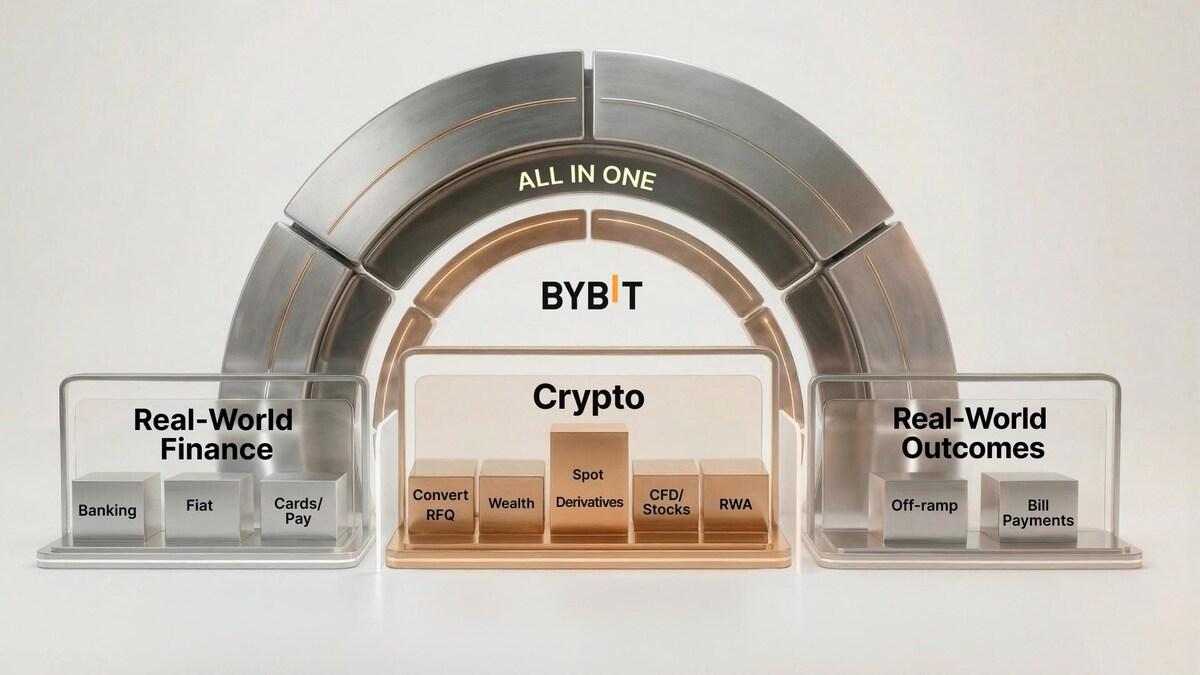BounceBit is a Bitcoin restaking protocol that blends CeFi and DeFi features to enhance the capabilities of Bitcoin. Unlike traditional Layer 2 solutions that depend on the Bitcoin blockchain, BounceBit functions as an independent Layer 1 PoS network.
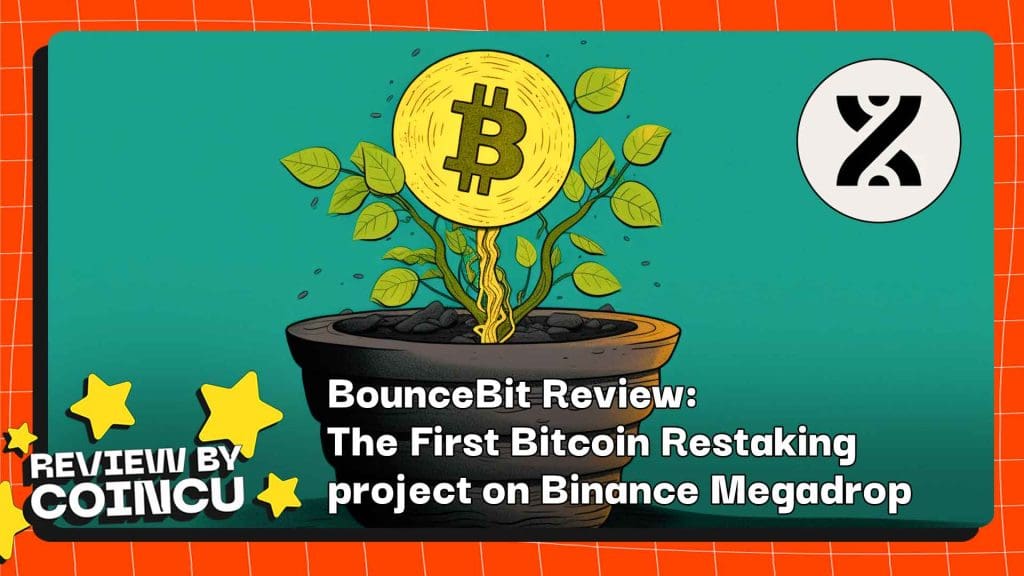
What is BounceBit?
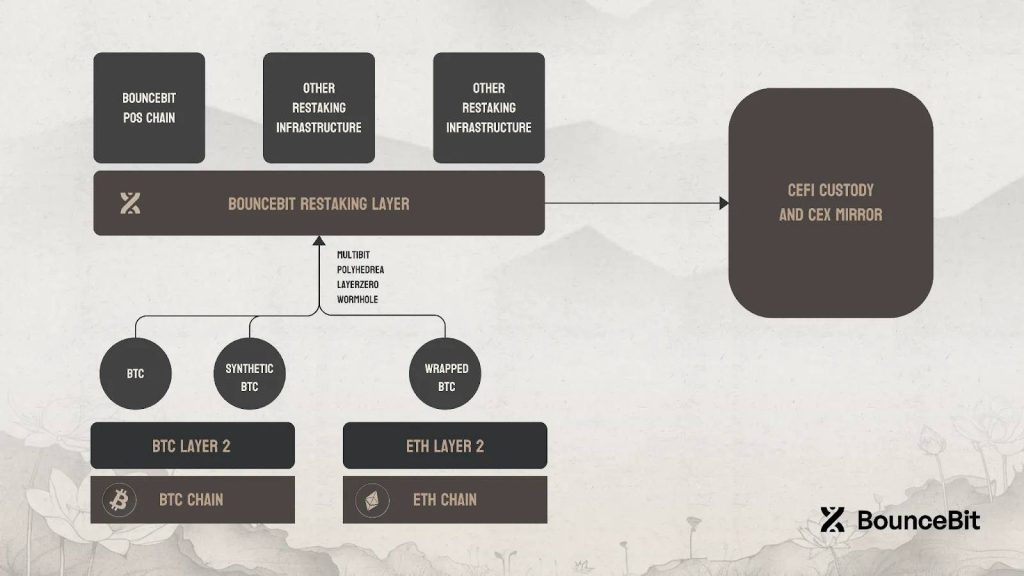
BounceBit is an infrastructural project offering products that allow restaking of various BTC assets. With BounceBit, it will be possible for BTC holders to generate profits both on-chain in DeFi and off-chain in CeFi.
BounceBit builds a strong infrastructure layer consisting of a suite of products, including sidechains, oracles, bridges, virtual machines, data availability, and more. Based on such a setup, users would be able to generate profits within activities of restaking BTC. The most important product is the BounceBit Chain—a Layer 1 blockchain, including a Proof of Stake mechanism that seamlessly merges with the Ethereum Virtual Machine, where BTC holders are able to generate profits within different networks.
Read More: El Salvador Mines $29M Bitcoin from Geothermal Plant!
How BounceBit Works
1. Dual-Token Staking Mechanism
BounceBit introduces a new dual-token restaking mechanism, where participants stake Bitcoin and BounceBit tokens. This restaking method is instrumental to network security and strengthens it considerably. Besides, this way brings a diversified stakeholder base that strengthens the ecosystem’s resilience.
2. Proof-of-Stake Consensus
BounceBit leverages a form of Proof-of-Stake (PoS) consensus mechanism known as Dual-Token PoS. Validators stake BB and/or BBTC (BounceBit’s native token, which is backed by Bitcoin) to record and validate transactions on the network. In return, validators receive transaction fees as staking rewards. This incentivizes continuous participation and strengthens the network.
3. Transparent Financial Services
For the questions of transparency and misuse issues common in traditional Bitcoin finance, BounceBit incorporates on-chain proof of reserve and transparent operations. Through this commitment to transparency, the project aims to restore user trust and create a secure platform for earning yields on idle BTC.
4. Enhancing Bitcoin Utility
BounceBit works towards increasing liquidity and utility for BTC by providing ways through which BTC holders can actively participate in DeFi and CeFi markets. This creates a transparent and efficient environment. Serving both retail and institutional investors, BounceBit’s inclusive ecosystem democratizes access to Bitcoin-based financial products. Through this, it expands yield opportunities and widens the use cases of Bitcoin.
5. Smart Contract Features
BounceBit recognizes the importance of smart contract capabilities and hence integrates full compatibility with the Ethereum Virtual Machine (EVM) and the Solidity programming language. This compatibility allows developers to seamlessly migrate their projects and build next-level dApps on the BounceBit platform, thereby enriching the range of applications and enhancing the utility of Bitcoin.
6. Unification Across Multiple Chains
By developing a unified platform that aggregates various forms of Wrapped BTC on different blockchain networks, BounceBit is able to consolidate liquidity and simplify transactions. This effort should improve the efficiency and liquidity of BTC assets across different blockchains.
Read More: Bitcoin Restaking Chain BounceBit Airdrop Now Available Checking Claim Amount
Main Feature of BounceBit
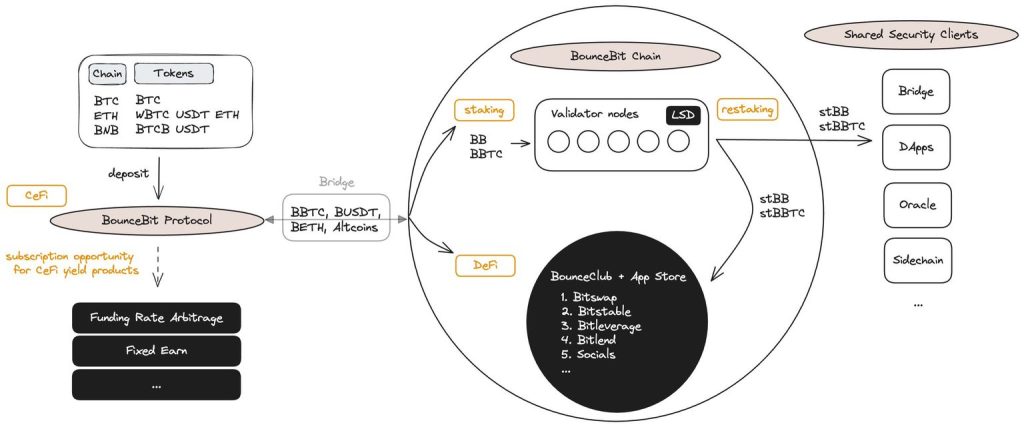
1. Shared Security Clients (SSC)
SSC stands for Shared Security Clients. It is another type of restaking applications on BounceBit. Such applications can include sidechains, oracles, bridges, VMs (Virtual Machine), DAs (Data Availability), and many more. Integrating SSCs on BounceBit unlocks many possibilities for ecosystem participants. BounceBit integrates mining smart contracts from the Bitcoin network.
There are multiple ways users on BounceBit can use their BTC:
- They are free to delegate their BTC by staking it for some validator in the BounceBit POS Chain. Doing so, staking users earn the liquid staking token stBTC. The users can further stake their stBTC, or restake to SSC in order to receive liquid restaking tokens.
- The users can directly stake BTC into SSCs, such as bridges or oracles, or use their BTC to participate in DeFi activities, like token swaps and yield farming.
2. BounceBit PoS Chain
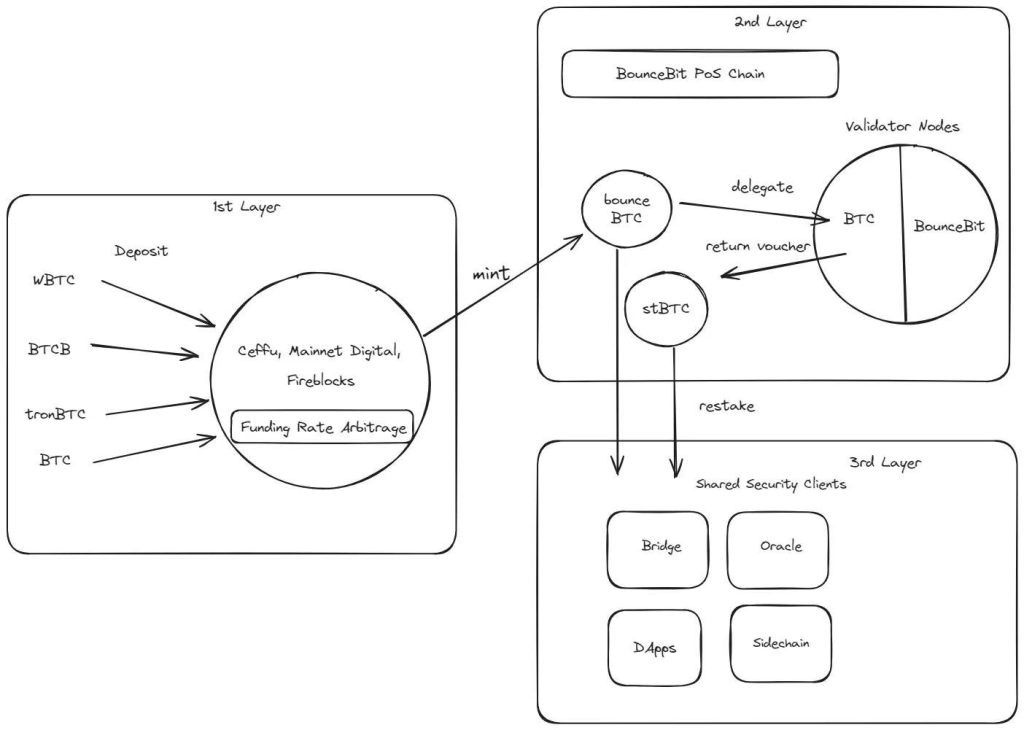
BounceBit PoS Chain is a Layer 1 blockchain running on SCC with the Proof of Stake consensus mechanism. However, it is a little bit different from other Layer 1 blockchains. In BounceBit, the PoS structure is set up such that the 50 validators will be divided equally into two parts: one staking BTC and the other staking BounceBit Token. The project calls it Dual-Token PoS. It was devised not just for increasing participation in the network but also to increase the resilience and security of the consensus mechanism in the network.
BounceBit PoS Chain is EVM and Solidity compatible. These are the programming languages used to create smart contracts on Ethereum. The architecture and functionality of the network were designed so that in the future, it would be much easier to transfer applications from Ethereum to BounceBit PoS Chain.
3. BounceBit CeFi + DeFi
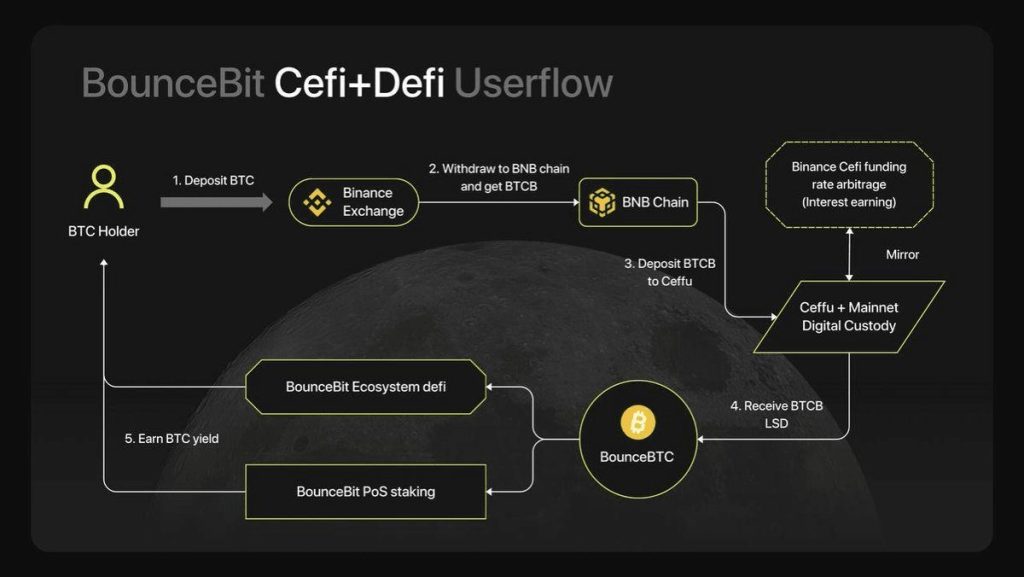
BounceBit is an innovative infrastructure for the easy transfer of Bitcoin funds between CeFi and DeFi platforms. The platform aims to increase Total Value Locked by integrating the strong security of centralized finance with the very promising, flexible opportunities of decentralized finance. Here’s how BounceBit maximizes user profits:
- BTC to BTCB: Users can seamlessly transfer their BTC from the Binance exchange to the BNB Chain (BEP20), which automatically converts to BTCB, a variant of Wrapped BTC on the BNB Chain.
- Water Margin Event Participation: Users can earn profits within the BounceBit ecosystem by depositing their BTCB on the BounceBit Water Margin TVL page.
- CeFi Regulated Custody: The deposited BTCB is entrusted to Mainnet Digital for safekeeping, ensuring top-tier security and integrity for BounceBit’s TVL. Participants receive BBTC liquid staking tokens as vouchers.
- Engaging in the BounceBit Ecosystem: Users can transfer their BBTC to the BounceBit PoS Chain to partake in various ecosystem activities, like staking for validators to earn liquid re-staking tokens stBBTC. These tokens enable users to participate in ecosystem projects, including DeFi, bridges, oracles, etc.
4. BTC Bridge
BTC Bridge by BounceBit is one of the products that helps to easily transfer BTC from the original chain of Bitcoin and various EVM chains to the BounceBit ecosystem. Transferred into the BounceBit ecosystem, BTC becomes BBTC for convenience and uniformity on the platform.
Tokenomics and Use Case
Token metrics
- Ticker: BB
- Total supply: 2.100.000.000 BB
Token allocation
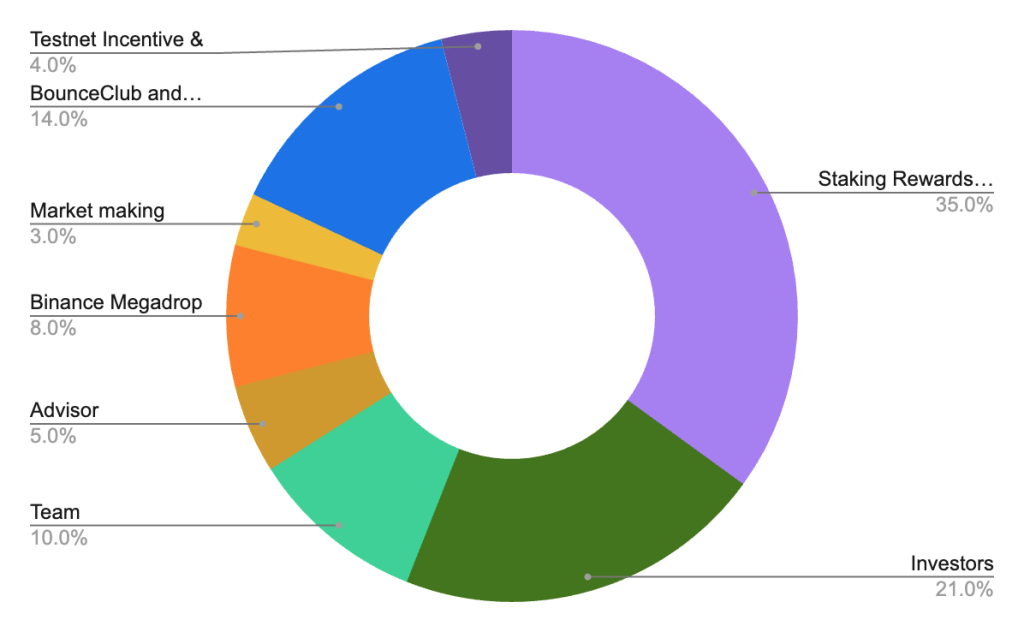
- Staking Rewards & Delegation Program: 35%
- Investors: 21%
- BounceClub & Ecosystem Reserve: 14%
- Team: 10%
- Binance Megadrop: 8%
- Advisors: 5%
- Testnet Incentives: 4%
- Liquidity Provision: 3%
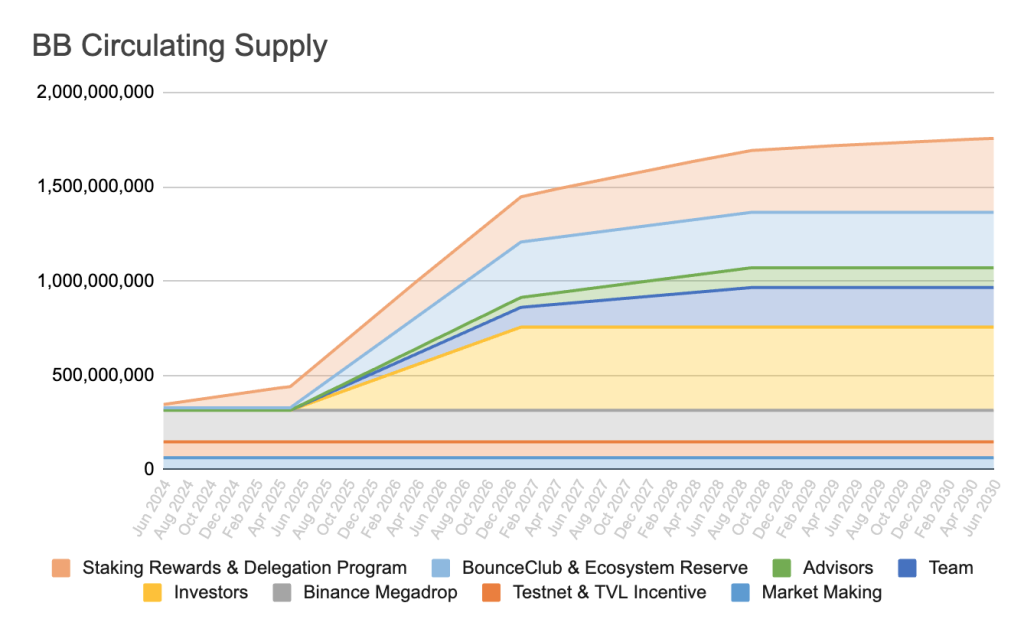
Use Case
- Users stake BB on the BounceBit PoS Chain to earn rewards.
- The BB token is utilized to pay gas fees on the BounceBit PoS Chain.
- BB is usable within the BounceBit PoS Chain ecosystem for projects.
- Users utilize BB to participate in project governance voting.
Team and Investors
Team
- Jack Lu: BounceBit was founded by Jack Lu in early 2024. Since 2018, he has also served as a partner at the venture capital fund NGC Ventures. The current team at BounceBit comprises approximately 15 employees and is projected to grow further by the end of 2024.
- Annie P. is the head of strategy at BounceBit.
- Joe Huang serves as the business development manager at BounceBit.
Investor and partners
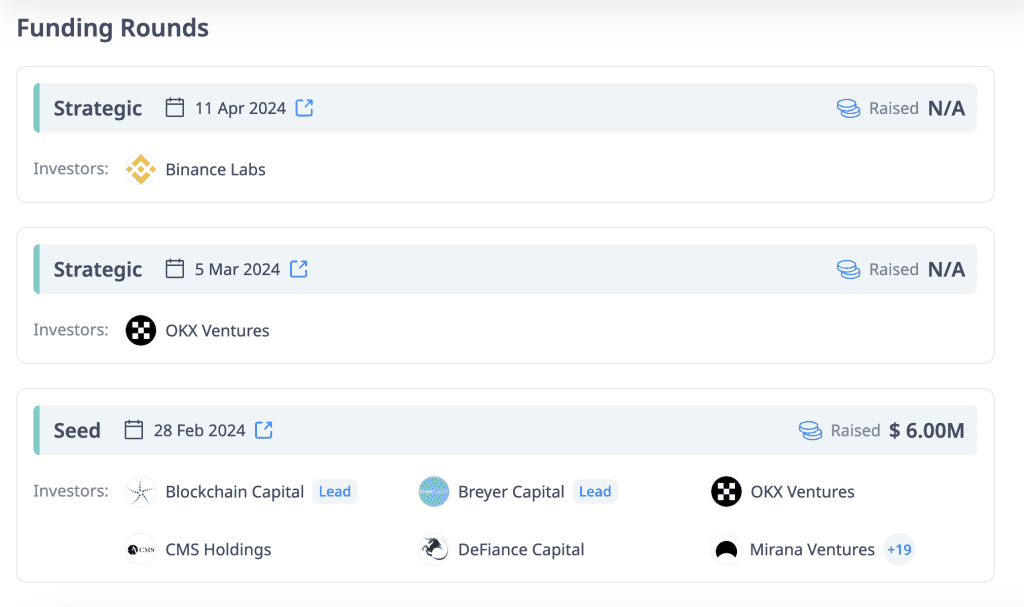
BounceBit has secured $6 million USD across three funding rounds, including two strategic investment rounds with undisclosed amounts of capital. Here is the breakdown of BounceBit’s funding history:
- Round 1 (02/28/2024 – Seed Round): BounceBit raised $6 million USD in a round led by Blockchain Capital and Breyer Capital, with contributions from NGC Ventures, OKX Ventures, CMS Holdings, and others.
- Round 2 (03/05/2024 – Strategic): OKX Ventures, the venture capital fund of OKX exchange, made a strategic investment in the project.
- Round 3 (04/11/2024—Strategic): Binance Labs, the venture capital arm of the Binance exchange, announced its investment in BounceBit.
In addition to receiving support from several major investment funds, BounceBit has formed partnerships with prominent projects like Polyhedra Network (ZK), as well as custody companies such as Mainnet Digital, Ceffu, and Fireblocks.
Roadmap
BounceBit’s roadmap for 2024 outlines the following key points:
Quarter 1: Initial development steps
- Launch marketing campaigns to raise project awareness.
- Introduce the testnet in March for community feedback to enhance the platform.
Quarter 2: Testing features, security, and scalability
- Roll out the Premium Yield Program (ongoing)
- Launch Mainnet BounceBit Chain
- Develop the ecosystem
- Distribute BounceClub
Quarters 3 & 4: Scaling the ecosystem
- Integrate CeDeFi products
- Implement Options & Structured products
- Enable Lending & Borrowing
- Establish the BounceBit Restaking platform
In the first quarter of 2025, BounceBit will focus on building the Shared Security Clients (SSCs) Ecosystem.
Conclusion
BounceBit is an innovative infrastructure project, bringing along products that allow the restaking of various types of BTC assets. With products ranging from sidechains and oracles to bridges, virtual machines, and data availability solutions, BounceBit is set to create an infrastructure layer through which users are able to leverage BTC restaking activities.
CoinCu rates bitcoin restaking set to lead the market. Binance Labs invested in Babylon and BounceBit, signaling interest in the sector. BounceBit can use the 100M+ user base of Bitcoin for users and liquidity. Poised to benefit from the 2024 Bitcoin DeFi trend.
FAQs
1. What is BounceBit’s primary objective?
BounceBit is purely built for Bitcoin and acts as a BTC restaking chain. Its key mission is to create a native smart contract execution environment for Bitcoin so it can actively engage within the ecosystem through network validation and yield-earning activities.
2. What are the components of BounceBit’s Layer 1?
BounceBit’s Layer 1 comprises of the following:
- Dual-token PoS: A hybrid consensus mechanism where each validator can accept both $BBTC and $BB tokens
- Native LSD module: It allows delegation of staking to validators and provides LST vouchers in return
3. How does BounceBit combine CeFi and DeFi?
BounceBit works on a model that aims to supercharge Bitcoin without changing the Bitcoin chain. It does this by tapping into funding rate arbitrage and generating on-chain certificates for restaking and mining. Merging centralized finance (CeFi) and decentralized finance (DeFi), BounceBit is opening new possibilities for Bitcoin, improving yield and expanding use cases.
4. What is the role of the $BB token in BounceBit?
The $BB token is the governance token inside the BounceBit ecosystem. $BB holders can participate in decision-making related to protocol updates, parameter changes, and any kind of governance.
| DISCLAIMER: The information on this website is provided as general market commentary and does not constitute investment advice. We encourage you to do your own research before investing. |




















